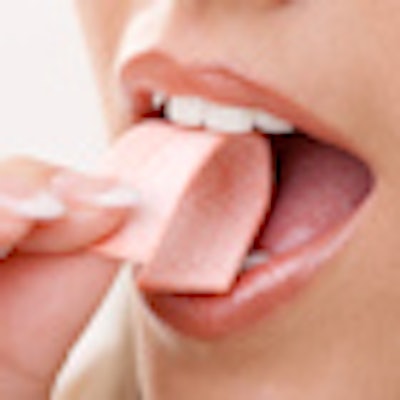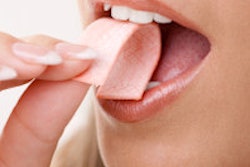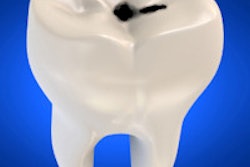
While the benefits of sugar-free gum for caries prevention have been well documented in the literature, a new study has found that sugar-free chewing gum used as an adjunct to tooth brushing may provide a small but significant reduction in plaque (International Journal of Dental Hygiene, June 30, 2012).
The American Academy of Pediatric Dentistry has endorsed the use of xylitol-containing products for caries prevention, the study authors noted. In addition, the ADA recommends sugar-free gum, and several sugar-free gum brands carry the ADA Seal of Acceptance on their packaging.
While earlier research demonstrated that sugar-free chewing gum could play a role in the prevention or reduction of dental caries, there has been no systematic, quantitative evaluation of the clinical effects of sugar-free chewing gum on plaque and parameters of gingival inflammation, study author Rosalien Keukenmeester, RDH, from the department of periodontology at the Academic Centre for Dentistry Amsterdam (ACTA), told DrBicuspid.com.
“This review indicates support for the use of sugar-free chewing gum.”
— Rosalien Keukenmeester, RDH
For this study, she and her co-authors reviewed current literature on the effects of sugar-free chewing gum on plaque and gingival inflammation. They searched up to April 20, 2012, to identify appropriate studies; ultimately, they screened 594 unique titles and abstracts and identified six nonbrushing and four brushing studies that met their criteria.
The eligibility criteria required the studies to be randomized controlled clinical trials, or controlled clinical trials conducted on human subjects 18 years or older without orthodontic appliances or partial dentures.
Moderation important
The intervention groups in the studies received sugar-free chewing gum sweetened
with xylitol or sorbitol and without any specific active/therapeutic ingredients, while the control groups did not use chewing gum. The clinical parameters included plaque scores and gingivitis scores.
The chewing regimens varied per study, from chewing one to two gums at the same time, with durations of 10 to 30 minutes and frequencies of four to six times daily.
The authors found that in the nonbrushing studies, the use of chewing gum did not significantly affect the parameters of interest. However, in the brushing studies, four of five showed a statistically significant effect in favor of the sugar-free chewing gum with respect to plaque scores.
"It is surprising that in the absence of brushing no scientific evidence for a beneficial effect of sugar-free chewing gum could be established, possibly because of inadequate power of the study designs," Keukenmeester said. "This systematic review indicates that properly designed studies with adequate numbers of subjects are definitely needed to demonstrate these effects."
This review found that when one gum was chewed for 10 minutes five times daily, a positive effect on the reduction of plaque score occurred as an adjunct to toothbrushing, she emphasized.
"As a recommendation to our patients, such a regimen may therefore be adequate to reduce intraoral plaque," she added.
Because sorbitol is a low-cariogenic sweetener rather than a noncariogenic sweetener, dentists should advise their patients who chew sorbitol-sweetened gum to do so no more than three times per day. Moreover, the extensive use of chewing gum containing sugar substitutes (xylitol or sorbitol) may have adverse effects, when ingested in abundant quantities -- they can act as a laxative and cause flatulence and diarrhea, Keukenmeester pointed out.
"Overall, this review indicates support for the use of sugar-free chewing gum as a part of normal oral hygiene," she concluded.
This review focused on the use of sugar-free chewing gum compared with no gum and excluded interventions involving sugar-free chewing gum with additional active/therapeutic ingredients, Keukenmeester added. Medicated gums -- for example, those containing vitamin C, chlorhexidine acetate, or urea -- were excluded because these ingredients may have an impact on the presence of plaque or gingival inflammation. A future paper will consider the effect of medicated gum.



















